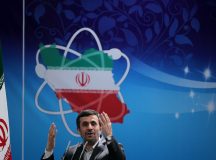Ladan Boroumand is the cofounder and research director of The Abdorrahman Boroumand Foundation (ABF), an NGO dedicated to the promotion of human rights and democracy in Iran. In this essay she reflects on the inspirational legacy for human rights advocates of Václav Havel (1936-2011) – the antitotalitarian dissident and playwright, the last president of Czechoslovakia (1989-1992) and the first president of the Czech Republic (1992-2003). Following the essay is a case study – the poet Hashem Sha’baninejad was hanged by the Iranian regime in January 2014 for ‘waging war against God’ – produced by Omid, the Foundation’s online memorial to every single known person executed or extra-judicially killed by the Islamic Republic.
Assessing President Havel’s legacy in the fight for human rights in Iran will not be an easy task as long as censorship, fear and oppression obstruct a proper study. But today, as an Iranian human rights activist, I can bear witness to the crucial importance of Havel’s teachings in our struggle for human rights.
I received The Power of the Powerless in late 2004, and though I knew and admired Václav Havel as an illustrious dissident, I must confess I had not read him. I was impressed by Havel’s understanding and clear vision of the truth, through the factitious layers of totalitarian ideology, an achievement that requires a rare intellectual strength and self-confidence. More importantly, speaking truth to the multitudes is a far more intimidating task than speaking truth to a tyrant, and that is precisely what Havel did inThe Power of the Powerless.
In The Power of the Powerless I also found comfort, as if the great man who had become my role model was retroactively giving approval to Omid, our project at the Abdorrahman Boroumand Foundation. There, two sisters, Roya and myself, after witnessing the assassination of our father in Paris amidst the indifference of the world – including even that of the democratic state that had given him asylum and protection – decided to take up the burden of their moral responsibility and stand up against Evil. As Iranian exiles, powerless and far from home, we found that, nonetheless, we had power: the power of telling the truth about the victims, which we did by creating an online memorial where every single case of execution and extrajudicial killing could be documented without regard to the charges, the gender, the profession, the religion, the opinion, or the social background of the victim. Our goal, then and now, is to restore, symbolically and posthumously, the common denominator of humanity that Islamist totalitarianism had destroyed.
Our intellectual encounter with Havel made us realise how urgently our fellow Iranian human rights activists and, indeed, every Iranian citizen needed to learn from him. In 2005, as part of our human rights and democracy virtual library project, we started to investigate the availability of Havel’s works in Persian.
Havel’s writing came to Iran in the 1990s and during the first decade of the 21st century. Some of his plays were available in Persian, including the Vanek trilogy, The Garden Party, andRedevelopment.
But until 2005, neither The Power of the Powerless nor Dear Dr. Husák, the two texts which established Havel as a prominent dissident, had been translated into Persian. That is why we requested and subsequently obtained President Havel’s gracious authorisation to translate three of his political essays, Dear Dr. Husák, The Power of the Powerless, and On the Meaning of Charter 77.
On 18 December 2012, the first anniversary of President Havel’s passing, the Foundation released the translation of Dear Dr. Husák. Since then, the letter has been viewed 9,270 times on our website, and 8,000 times on two other websites that, like ours, are blocked inside Iran. However, our library is available through proxies, and many other blogs and websites have posted the letter. For all of these we don’t have any statistics, but we know that the letter has been seen at least 17,000 times so far, which is remarkable, given that it has been up less than a year and has had no major publicity.
To these incomplete numbers one can add other piece of anecdotal evidence: a phone call from Tabriz in Iranian Azerbaijan, thanking the Foundation for the translation and informing us that it has been studied in a small book club. Or a number of emails we have received thanking us for publishing the letter. This reception is not surprising, for indeed our choice of Havel’s texts was not accidental.
There is a tendency among us Iranians to think that our current regime is the outcome of our cultural, religious and historical background, and for this reason we cannot hope for a secular democracy comparable to those established in the West. Havel’s minute and precise description of the social, political, and moral situation of his country under communist rule reveals an astonishing resemblance to the daily experience of Iranians under their own post-totalitarian Islamist rule. Reading Dear Dr. Husák and The Power of the Powerless makes us feel less isolated and helps us understand that what we are experiencing is, after all, a variation on the theme of modern totalitarianism.
More importantly, the selected essays, including On the Meaning of Charter 77, were written when the situation appeared to be hopeless in Czechoslovakia, and when any attempt to react was dismissed with scepticism and cynicism. It was precisely at this time that Havel, instead of submitting to the rules established by the oppressor, took his pen and redefined the rules of the game.
Suffice it to ponder the subversive nature of those thirty pages addressed to the almighty leader of his country. With a pen and an amazing strength of mind, in one stroke the powerless dissident dismisses the ideological postulate of his adversary and replaces it with the only valid one: that of human dignity and freedom. Then, based on this new postulate, in line after line, paragraph after paragraph, he transforms into utter defeat what appeared, to the world, to the government, and to the Czech people, a spectacular victory for the regime. By expressing his thoughts in the form of a letter, Havel calls upon the leadership to face its responsibility, just as he assumes his share as a citizen. The Power of the Powerless is the logical continuation of Dear Dr. Husák. He addresses his fellow citizens on the basis of their responsibility, and he demonstrates with the same rigorous analysis how, by their acquiescence in living a lie, they have become accomplices in their own oppression.
Instead of seeking victory in the fall of the regime, he points to a different victory, one that depends only on each individual’s will and decision to live in truth. Thus, from Havel’s standpoint, there is no defeat in engaging in the struggle for human rights. At worst one restores one’s own dignity and free will, and reconnects with history and the human community; at best one contributes to the establishment of free institutions in his homeland. Given the time and the circumstances of the writing of these texts – when the perspective of democratic transition was bleak – one must admit that Václav Havel achieved an extraordinary tour de force.
If I were to summarise the human rights legacy of the late President Havel for all human rights advocates around the world I would say: thoughtfulness, hope, and resilience.





































